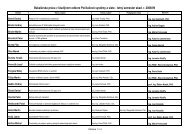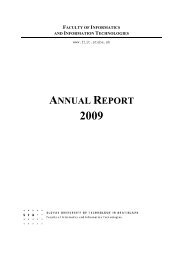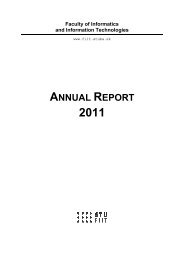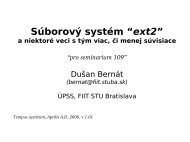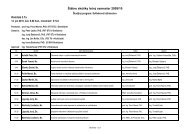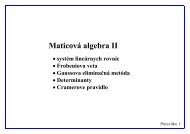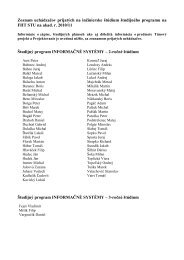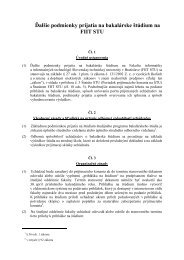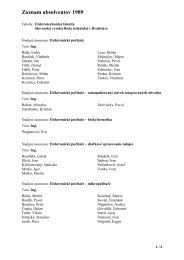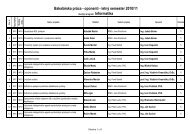elektronická verzia publikácie - FIIT STU - Slovenská technická ...
elektronická verzia publikácie - FIIT STU - Slovenská technická ...
elektronická verzia publikácie - FIIT STU - Slovenská technická ...
You also want an ePaper? Increase the reach of your titles
YUMPU automatically turns print PDFs into web optimized ePapers that Google loves.
Personalized Collaboration 271<br />
[23] Houston, T. K., Cooper, L. A., Ford, D. E.: Internet support groups for depression: A 1-<br />
year prospective cohort study. American Journal of Psychiatry, 159, pp. 2062–2068, 2002.<br />
[24] Inaba, A., Supnithi, T., Ikeda, M., Mizoguchi, R., Toyoda, J. I.: How Can We Form Effective<br />
Collaborative Learning Groups? In Proc. of Intelligent Tutoring Systems 2000,<br />
Montréal, Canada, pp. 282–291, 2000.<br />
[25] Jarboe, S.: Procedures for enhancing group decision making. In Communication and Group<br />
Decision Making. Sage Publications, pp. 345–383, 1996.<br />
[26] Jaworski, A., Coupland, N.: The Discourse Reader. Routledge, London, 2006.<br />
[27] Jermann, P., Soller, A., Mühlenbrock, M.: From mirroring to guiding: A review of the<br />
state of art technology for supporting collaborative learning. European Conference on<br />
CSCL, pp. 324–331, 2001.<br />
[28] Kelley, H. H., et al.: Close Relationships. Percheron Press, 2002.<br />
[29] Kumar, V.: Algorithms for Constraint Satisfaction Problems: A Survey. AI Magazine,<br />
Vol. 13. Issue 1, pp. 32–44, 1992.<br />
[30] Lai, K., et al.: Incentives for cooperation in peer-to-peer systems. In Proc. of Workshop on<br />
the Economics of Peer-to-Peer Systems, 2003.<br />
[31] Leone, N., et al.: The DLV system for knowledge representation and reasoning. In ACM<br />
Transactions on Computational Logic (TOCL), 7(3), pp. 499–562, 2006.<br />
[32] Levi, D.: Group Dynamics for Teams. Sage Publications, 2007.<br />
[33] Maes, P.: How To Do The Right Thing. Connection Science, 1(3), pp. 291–323, 1998.<br />
[34] Malinowski, B. K.: The problem of meaning in primitive languages. In: The Meaning of<br />
Meaning. Routledge & Kegan Paul, 1923.<br />
[35] Moreno, M., Vivacqua, A., de Souza, J.: An Agent Framework to Support Opportunistic Collaboration.<br />
Springer, 2003.<br />
[36] Mühlenbrock, M.: Action-based Collaboration Analysis for Group Learning. IOS Press, 2001.<br />
[37] Mühlenbrock, M.: Analyzing collaborative learning interactions in shared workspaces.<br />
Künstliche Intelligenz, 1/03, pp. 37–39, 2003.<br />
[38] Ounnas, A., Davis, H. C., Millard, D. E.: A Metrics Framework for Evaluating Group<br />
Formation. ACM Group'07, Florida, USA, 2007.<br />
[39] Ounnas, A., Davis, H. C., Millard, D. E.: A Framework for Semantic Group Formation.<br />
In roc of 8th IEEE International Conference on Advanced Learning Technologies, Spain, 2008.<br />
[40] Parks, C., Sanna, L.: Group performance and interaction. Westview, 1999.<br />
[41] Reeves, B., Nass, C.: The Media Equation: How People Treat Computers, Television, and New<br />
Media Like Real People and Places. Center for the Study of Language and Information, 2003.<br />
[42] Resnick, P., Friedman, E.: The social cost of cheap pseudonyms. Journal of Economics &<br />
Management Strategy, 10(2), pp. 173–199, 2001.<br />
[43] Roschelle, J., Teasley, S.: The construction of shared knowledge in collaborative problem<br />
solving. Computer-Supported Collaborative Learning, Springer, pp. 69–97, 1995.<br />
[44] Soh, L., Khandaker, N., Liu, X., Jiang. H.: A computer-supported cooperative learning<br />
system with multiagent intelligence. In Proc. of Autonomous Agents and Multi-Agent Systems,<br />
2006.



